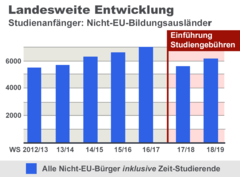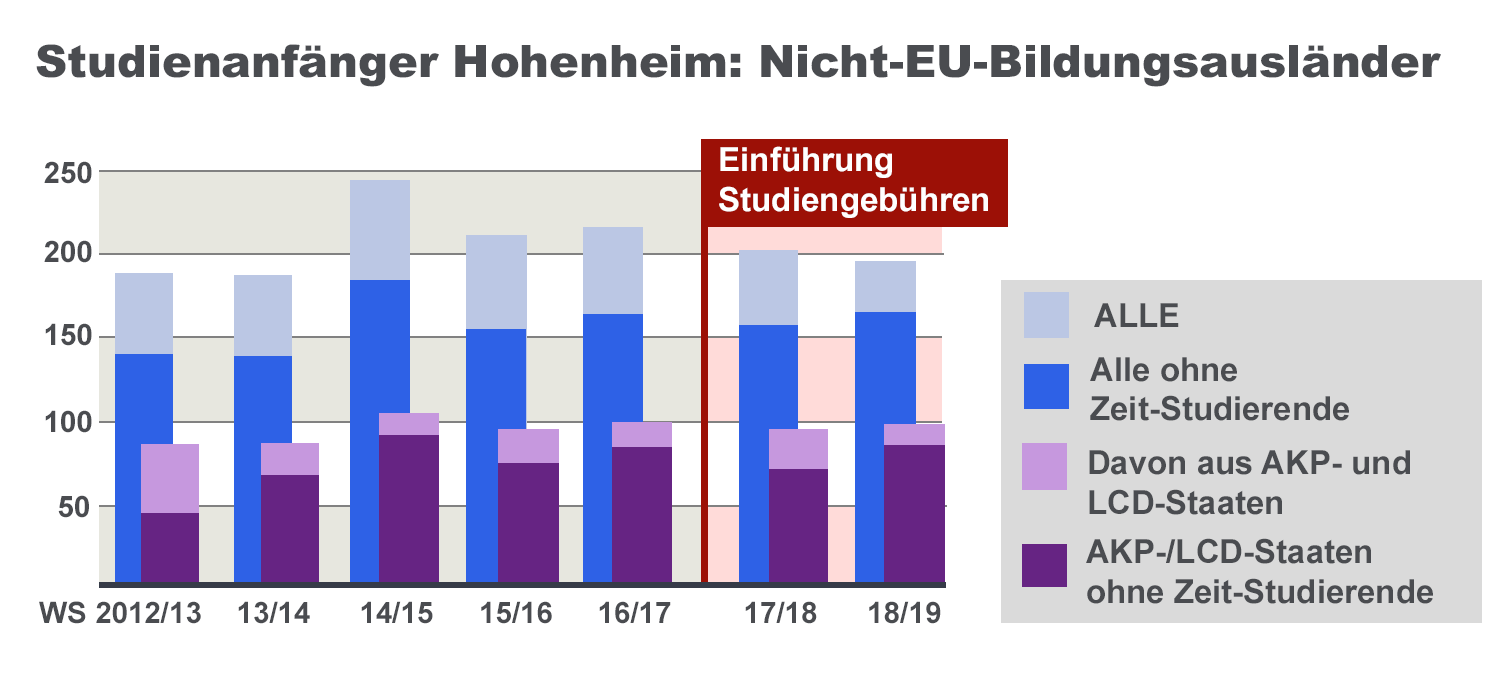Effect of tuition fees
No Further Decline in International Student Numbers [15.04.19]

New enrollments of non-EU citizens at universities in Baden-Württemberg - including non-degree-seeking students (who pay no tuition fees).
Although the official student statistics are not yet available from the State Statistical Office, the Ministry has now published a first excerpt.
According to the study, the number of new enrollments of international students from non-EU states in the winter semester 18/19 rose noticeably across the country (+ 8.7%) compared to the previous year. However, the current value (6,194) is still about 13% lower than in the winter semester 2016/17 (7,039) - the year before the introduction of the fees.
If one excludes non-degree-seeking students*), who are exempt from the fees, the percentage decline in the group of those actually affected is likely to be somewhat higher nationwide. However, the Ministry did not present a separate evaluation of this.
*Definition: Non-degree-seeking students come to Baden-Württemberg for a limited period of time within the framework of university cooperations and do not seek a degree from a local university. At the University of Hohenheim, they currently account for approximately 16 percent of the new enrollments of non-EU foreign students.
A surprising effect occurred in the art and music colleges: Despite the state-wide decline, 7.1% more new students from non-EU countries enrolled when fees were introduced. In the current winter semester, the colleges of art and music in this group once again recorded an increase of 6.7%.
Approx. the same number of new enrollments in Hohenheim as 2 years ago

In comparison with most other universities in Baden-Württemberg, the introduction of the fees a year and a half ago had a lower impact on student statistics at the University of Hohenheim. If one excludes the fee-exempt non-degree-seeking students, the number of new enrollments from non-EU states fell from 164 to 155 in the winter semester 17/18.
In the current winter semester, Hohenheim has been able to return to the level it had before the introduction of the fees with 165 new enrollments. This also applies to students from developing countries with a particularly low per capita income (ACP/LCD states), who make up about half of the students from non-EU states in Hohenheim.
"From our point of view, it is surprising, but of course very encouraging, that the number of new students appears to be stabilizing in the second year after the introduction of tuition fees," said Franziska Schenk from the Office of International Affairs at the University of Hohenheim. "Prospective students from abroad are apparently making a very conscious choice for the University of Hohenheim. We attribute this to Hohenheim's special profile and the international reputation of the university."
Social impacts unknown
However, Prof. Dr. Regina Birner, Dean of Studies at the Faculty of Agricultural Sciences, remains particularly concerned about the ACP and LDC countries.
"Naturally, I am pleased that the major downturn has failed to materialize - even though we are still experiencing a significant decline in certain degree programs in the Faculty of Agricultural Sciences. However, the figures alone do not tell the whole story. We do not know, for example, whether we might be addressing a completely different pool of prospective students today than before - in other words, whether we have lost young people who come from less well-off backgrounds. In my view, free study in Germany was one of the most effective development aid measures possible, as graduates of our degree programs often make an important and lasting contribution to development in their home countries," Birner said.
Likewise, the figures do not show how high the burden would be for individual students, who might now have to work several jobs in addition to their studies in order to pay the fees.
State reports income of approx. 10 million euros per year
All non-EU citizens who have enrolled at a university in Baden-Württemberg for the first time since the winter semester 2017/18 must pay tuition fees of € 1,500 per semester. Exempt are, among others, non-degree-seeking students, international students who completed their Abitur in Germany, students with a strong ties to Germany, and asylum seekers with good prospects of staying. In addition, universities may grant further exemptions to a limited number of students.
According to the Ministry's press release, the country currently earns about 10 million euros per year through the fees. This amount will continue to grow until all Bachelor's and Master's cohorts at the universities are covered by the obligation to pay fees.
80% of the fees are used by the state to balance the budget. Only 20% of the income remains at the universities. At the University of Hohenheim, this corresponds to a sum of almost €40,000 for the current winter semester.
Hohenheim wants to promote welcome culture
With the funds that remain at the university, Hohenheim aims in particular to promote the welcome culture on campus and support the social and professional integration of international students. Specifically, measures are mainly financed in three areas:
- Subsidies for the participation fees for the intensive German language courses during the semester break
- Expansion of offers for international students, e.g. Facts & Skills seminar in the new orientation week for international students, promotion of the Buddy Program, support for language study preparation in German and English
- "Tuition Fees Scholarships" with a focus on developing countries (ACP/LDC states): The University of Hohenheim is thus making use of a legal option whereby up to 10 additional students can be exempted from tuition fees through internal university regulations in addition to the 5% of students provided for by law.